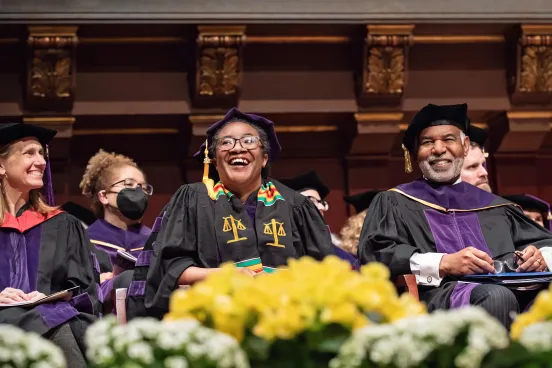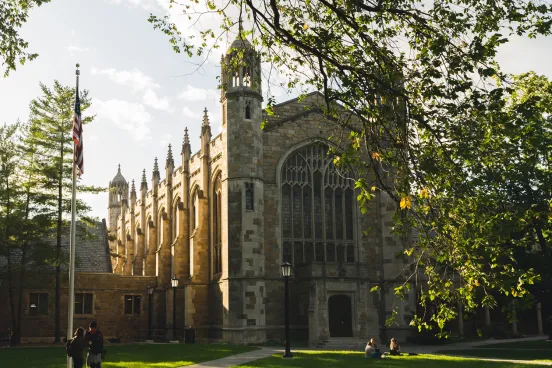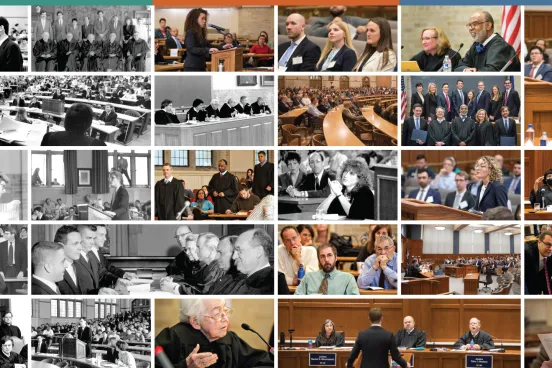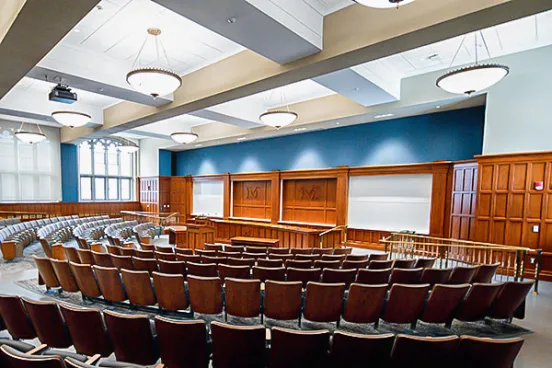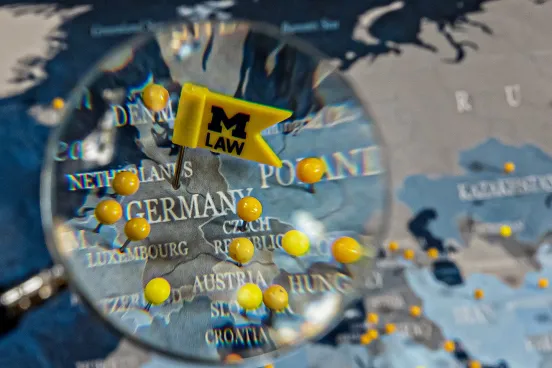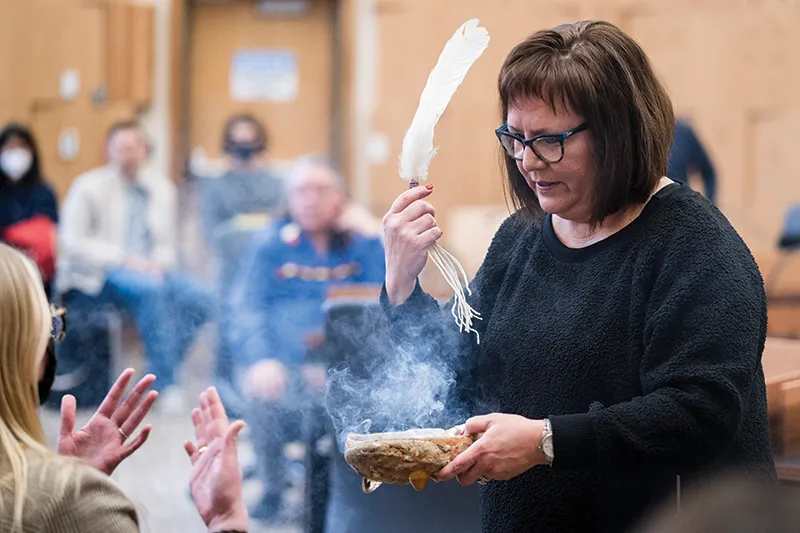
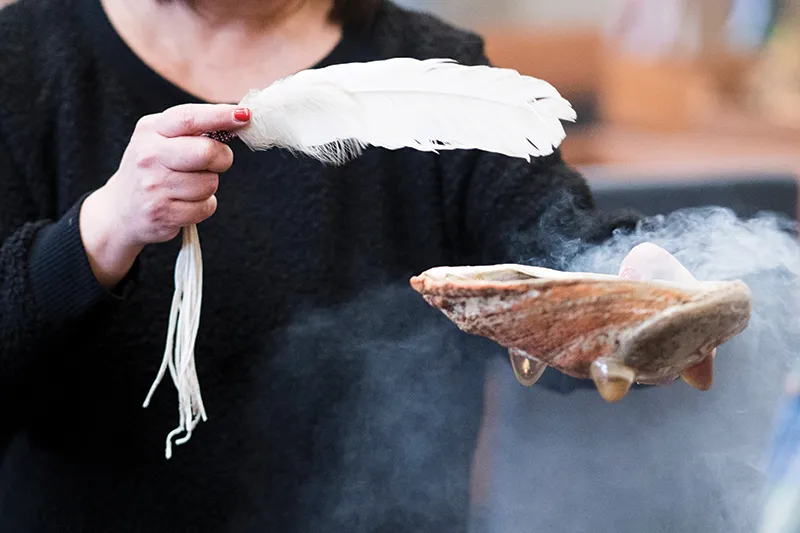
Earlier this year, students in Michigan Law’s Problem Solving Initiative (PSI) course Policing by Indian Tribes had the opportunity to take a deep dive into the legal challenges that complicate law enforcement in Native American communities. In doing so, they found that there are rarely simple answers to the questions that arise.
The PSI is a multidisciplinary format that brings together students and faculty from the Law School and other U-M units to actively apply creative problem solving and collaboration to a range of pressing challenges. The spring 2022 course was co-taught by Professors Matthew L.M. Fletcher, ’97, and April Youpee-Roll, who are tribally enrolled members of the Grand Traverse Band of Ottawa and Chippewa Indians in northern Michigan and the Fort Peck Tribes in northeastern Montana, respectively.
Fletcher has taught Federal Indian Law and Tribal Law intermittently as a visiting professor at the Law School since 2011; he joined the Law School full time as the Harry Burns Hutchins Collegiate Professor of Law in July. He also serves as the chief appellate judge for the Pokagon Band of Potawatomi Indians and the Poarch Band of Creek Indians. Youpee-Roll has nearly a decade of experience in federal and tribal policy and is a litigation associate in the Los Angeles office of Munger, Tolles & Olson LLP, where she also maintains an active pro bono practice in American Indian law.
The 574 federally recognized Native American tribes exist in a cross-jurisdictional matrix involving federal, state, local, and tribal agencies. This complexity, combined with limited resources, contributes to higher than average violent crime rates on these tribal lands. According to the Department of Justice, more than four in five Native adults have experienced some form of violence in their lifetime, and women are particularly at risk. Additionally, unarmed Native Americans are killed in police encounters more than any other ethnic group, according to the Centers for Disease Control and Prevention.
The PSI class analyzed relevant cases such as US v. Cooley, which questioned whether a tribal police officer could detain and search a non-tribe member within a reservation on suspicion of violating a state or federal law. Students interviewed tribal, federal, and state judges, lawyers, and elected officials to generate ideas on how to reform reservation policing using culturally appropriate methods.
Diverse backgrounds replicate real-life thinking
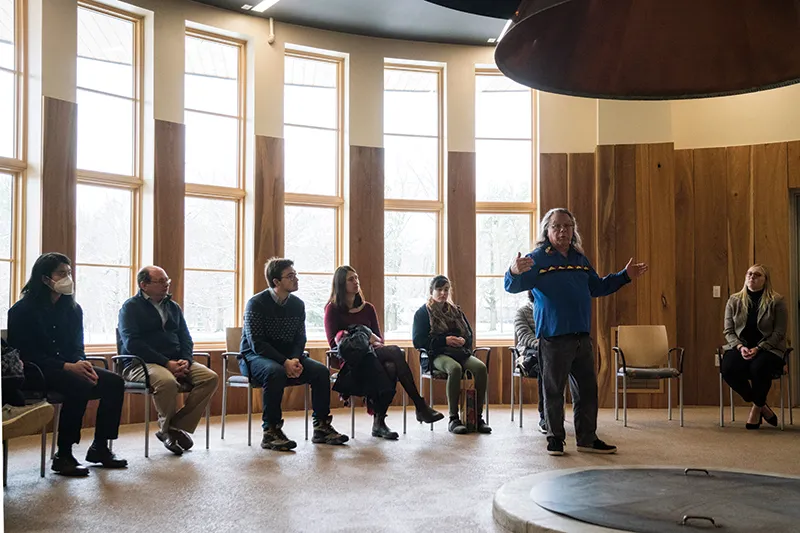
Part of the power of the class, says Youpee-Roll, is how it brought indigenous and non-indigenous voices together to explore these complex issues.
“The PSI is a really good fit for Indian law because it makes students from multiple backgrounds and with various value systems, priorities, and bases of knowledge come together in a way that replicates the thinking around these problems in real life,” says Youpee-Roll. “The topic of the class is such a fraught area, and I thought we really benefited from having the perspectives of students from a multitude of disciplines, as well as Native students.”
As a non-indigenous person, Maia O’Meara, a PSI student from the Gerald R. Ford School of Public Policy, says, “I wasn’t really comfortable with the idea of proposing a ‘solution’ to the topics of this class, but I wanted to get a better understanding of different situations on the ground.” Because she wants to work for the federal government, O’Meara says it was helpful to learn about different ways that tribal nations have improved services, policies, and law enforcement within their communities. “For example, some tribes implement alternative solutions such as peacemaking and healing circles for people who might be able to reach an agreement more collaboratively, as opposed to going through the court system,” she says.
For 3L Tim Devine, a first-generation descendant of the Little Traverse Bay Bands of Odawa Indians, the class struck a personal and professional chord.
“The PSI was an amazing opportunity for me to learn from Professor Fletcher, another Anishinaabe man, about issues that really matter to me and that ultimately affect all practicing lawyers in this country. Whether it’s criminal law or financial law, all US policy impacts Native people,” says Devine, who plans to practice Indian law. “This class was a helpful illustration of the importance of humility and of listening. As lawyers, we tend to look at everything as a legal problem with a solution in court or by a statute or by a new regulation, but I’ve learned that it’s not always prudent to lead with that framework. This class has driven home how important it is to listen to tribal members about what their intentions are, what they need, and what policy might assist them in achieving their goals.”
Complex questions that don’t exist in a vacuum
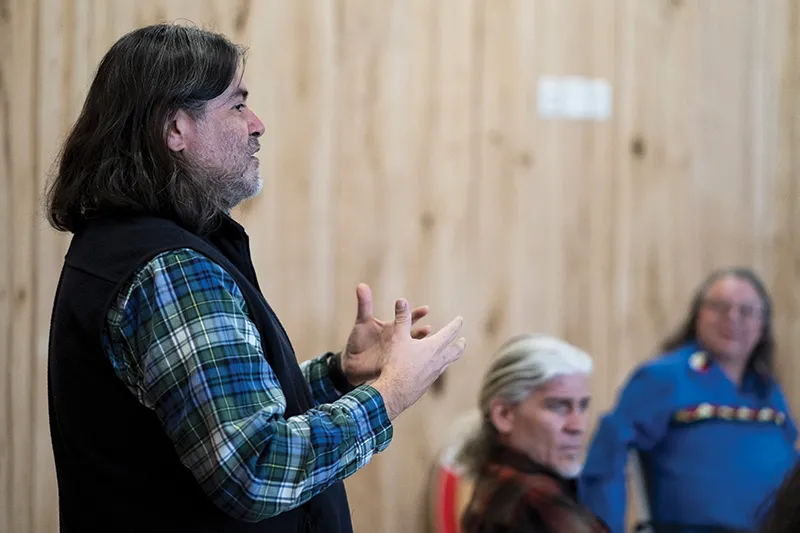
Divided into four groups, students worked to determine if alternate approaches to tribal policing were possible. They focused on a range of issues, including high crime rates, a lack of shared institutional knowledge, truancy on Native lands, and cross-deputization agreements (cooperative arrangements created between various law enforcement jurisdictions).
“These legal questions don’t exist in a vacuum and never have simple answers—there are always interviews with clients, and there are facts that have to be discovered. All of these elements were at play in this PSI course, which really replicated the kinds of problems present in Indian country,” says Fletcher. “Additionally, lawyers don’t exist unilaterally; we always have to incorporate nonlawyers in our work. This kind of engagement is something that I never saw when I was in law school, and it makes for a class that is difficult but extremely valuable.”
Fletcher believes that Indian law is a “huge possible practice area,” and he looks forward to continuing to prepare students to tackle Native legal issues in the real world.
According to 3L Mitchell Forbes, he’s off to a great start.
“I jump at any opportunity to learn from Professor Fletcher, especially this class, which breaks the traditional law school mold,” says Forbes, who recently served as a summer associate with the Native American law and policy group at Dentons in Washington, DC. “Like with all PSI topics, there are almost always no easy solutions within the field of Indian law. As an Inupiaq from the Native Village of Shishmaref in northwest Alaska, the chance to advocate for tribes and tribal interests is one of the primary reasons I came to Michigan Law.”



